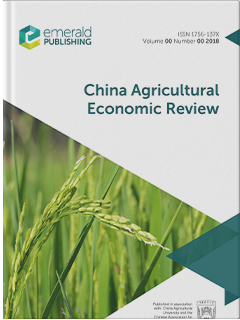爱尔兰传统价值链中有机牛的损失:经济和环境影响是什么?
IF 4.6
2区 经济学
Q1 AGRICULTURAL ECONOMICS & POLICY
引用次数: 0
摘要
本文旨在量化爱尔兰传统价值链中有机牛的损失(或泄漏),并评估其经济和环境影响。本文采用生物经济投入产出(BIO)模型,这是一个代表不同经济部门之间相互依赖关系的定量经济模型,以评估爱尔兰牛肉部门有机泄漏的经济和环境影响。研究发现,由于牛肉价值链发展的不平衡,1岁以下有机牛中有17%离开有机价值链,渗漏到传统市场。这次有机泄漏造成的经济损失为566万欧元。泄漏还会对环境造成影响,因为有机农场较长的育肥时间和传统农场使用的化肥会改变生命周期中甲烷和氮的排放。有机泄漏导致82吨甲烷排放量减少,52吨氮排放量增加,从而在100年的时间范围内产生11,484吨的净全球变暖潜能值(GWP)。由于数据的可用性,研究集中在2015年的基准年,这一年有爱尔兰的国家数据可用于分类。因此,鼓励研究人员在获得更多最新数据时评估经济和环境影响,并分析多年来影响的变化。本研究有助于对有机转化的讨论,并为利益相关者,特别是政策制定者设计未来的有机方案提供了有价值的见解。原创性/价值这是第一篇评估牛肉部门有机泄漏的论文。本文章由计算机程序翻译,如有差异,请以英文原文为准。
Loss of organic cattle to the conventional value chains in Ireland: what are the economic and environmental impacts?
Purpose This paper aims to quantify the loss (or leakage) of organic cattle to conventional value chains in Ireland and assess its economic and environmental impacts. Design/methodology/approach The paper adopts a Bio-economy Input-Output (BIO) model, a quantitative economic model representing the interdependencies between different sectors of the economy, to assess the economic and environmental impacts of organic leakage in the Irish beef sector. Findings The study reveals that 17% of organic cattle aged under 1 year old leave the organic value chain, leaking to the conventional market as a result of imbalances in the development of the beef value chain. The economic cost of this organic leakage is 5.66 million euros. Leakage also has environmental effects because of changes in lifecycle methane and nitrogen emissions based on longer finishing times on organic farms and chemical fertilisers applied on conventional farms. The organic leakage results in a reduction of 82 tons of methane emission and 52 additional tons of nitrogen emission, which leads to 11,484 tons of net global warming potential (GWP) for a 100-year time horizon. Research limitations/implications Because of data availability, the research focussed on the baseline year 2015, which had national data available for disaggregation in Ireland. Therefore, researchers are encouraged to assess the economic and environmental impacts when more recent data are available and to analyse the change in the impacts over the years. Practical implications This study contributes to the discussion on organic conversion and provides valuable insights for stakeholders, especially policymakers, for the design of future organic schemes. Originality/value This is the first paper to assess organic leakage in the beef sector.
求助全文
通过发布文献求助,成功后即可免费获取论文全文。
去求助
来源期刊

China Agricultural Economic Review
AGRICULTURAL ECONOMICS & POLICY-
CiteScore
9.80
自引率
5.90%
发文量
41
审稿时长
>12 weeks
期刊介绍:
Published in association with China Agricultural University and the Chinese Association for Agricultural Economics, China Agricultural Economic Review publishes academic writings by international scholars, and particularly encourages empirical work that can be replicated and extended by others; and research articles that employ econometric and statistical hypothesis testing, optimization and simulation models. The journal aims to publish research which can be applied to China’s agricultural and rural policy-making process, the development of the agricultural economics discipline and to developing countries hoping to learn from China’s agricultural and rural development.
 求助内容:
求助内容: 应助结果提醒方式:
应助结果提醒方式:


